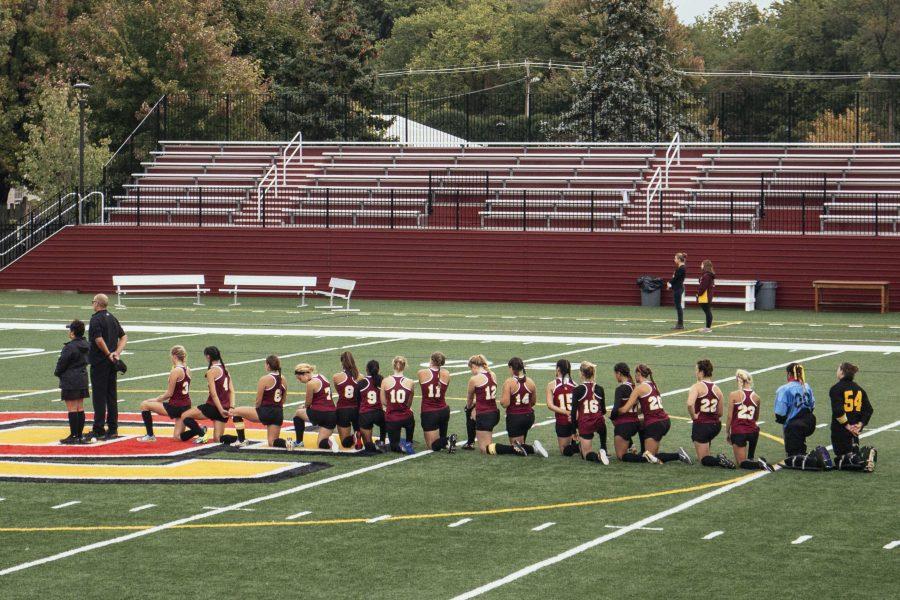Field Hockey Joins Anthem Protest
The Yeowomen kneel during the national anthem before facing off against NCAC foe Denison University last Thursday.
September 30, 2016
National anthem protests in athletics draw a range of reactions from scorn to admiration. That national debate came to Knowlton Athletics Complex when the field hockey team kneeled during the Star Spangled Banner last Friday.
“[We want] to express to fellow students, community members and people everywhere that we will not accept racial violence and police brutality as a part of our country,” said senior captain Maureen Coffey.
Coffey said the team was inspired to protest police violence against black people after recent events in Charlotte, NC, including the shooting of Keith Scott, who was unarmed. Upon the suggestion of senior Julia Birenbaum, the Yeowomen followed in the footsteps of Colin Kaepernick, an NFL quarterback for the San Francisco 49ers. Kaepernick sparked the movement in August by refusing to stand for the national anthem during a preseason game against the Seattle Seahawks.
“[Our protest] is for the same reason,” said Birenbaum, a San Francisco native. “I read about Colin Kaepernick, and why he did it and I thought, ‘That’s a really good reason.’”
When the national media buzz surrounding Kaepernick’s protest made its way to the field hockey team, Coffey said the team coalesced around the chance to join the conversation.
“[Kaepernick’s] actions got a lot of attention in the media, and I know I had been thinking about it for a while,” Coffey said. “When Julia said she wanted to kneel, most of the team was already considering it. Right away everyone was very supportive of the idea.”
After the team’s demonstration during the game’s opening ceremony Homecoming weekend, the Yeowomen came out strong against Ohio Wesleyan University. Fending off numerous barrages from the Battling Bishops, the Yeowomen successfully kept the ball on the attacking side of the field. Coffey and senior classmate Ariana Enzerink struck two hard-hitting shots, both of which the Battling Bishops goalkeeper managed to turn away.
The match was even until the 58th minute of play, when Ohio Wesleyan found the back of the net twice in 11 minutes. Both teams finished with a total of 13 shots, and despite outshooting the Battling Bishops 9–8, Oberlin outshot OWU 9–8, the Yeowomen still came up short, falling 2-0.
Individual successes were present, however, on both sides of the field. Senior goalkeeper Maggie Gossiaux gave a strong performance, blocking six out of Ohio Wesleyan’s eight shots on goal. Enzerink and Coffey contributed four and five shots, respectively, and rookie Libby Royer rifled two shots.
The following Sunday, Oberlin traveled to Wittenberg University and continued to kneel in solidarity.
“One of the parents in the crowd said something to one of our parents,” Birenbaum said. “They were like, ‘What is the Oberlin team kneeling for?’” The response was, ‘It’s exactly what you think it is.’”
Although Wittenberg eventually defeated the Oberlin 4–1, sophomore midfielder Meg Parker recorded her first goal of the season in the 33rd minute.
As the team approaches the halfway mark in the 2016 campaign, it is still winless at 0–8, but Coffey said the squad’s chemistry is constantly improving.
“Team dynamics have been really great this year,” Coffey said. “The level of trust in our playing has increased so much, and it’s such a positive feeling to know that everyone has your back, on and off the field.”
The players plan to kneel for the duration of the season, as long as the team to continues to agree upon its value.
“I wouldn’t do anything that the rest of the team wouldn’t want to do, but I personally really want to [continue the protest],” Birenbaum said.
The coaching staff is also on board with the protest. Head Coach Tiffany Saunders and Assistant Coach Jessica Franklin said they value players’ rights to use their voices.
“We support the ability to let our student-athletes express themselves. This is a freedom of speech movement, so I think it’s important,” Saunders said. “Field hockey is a platform, and they can use it.”





















